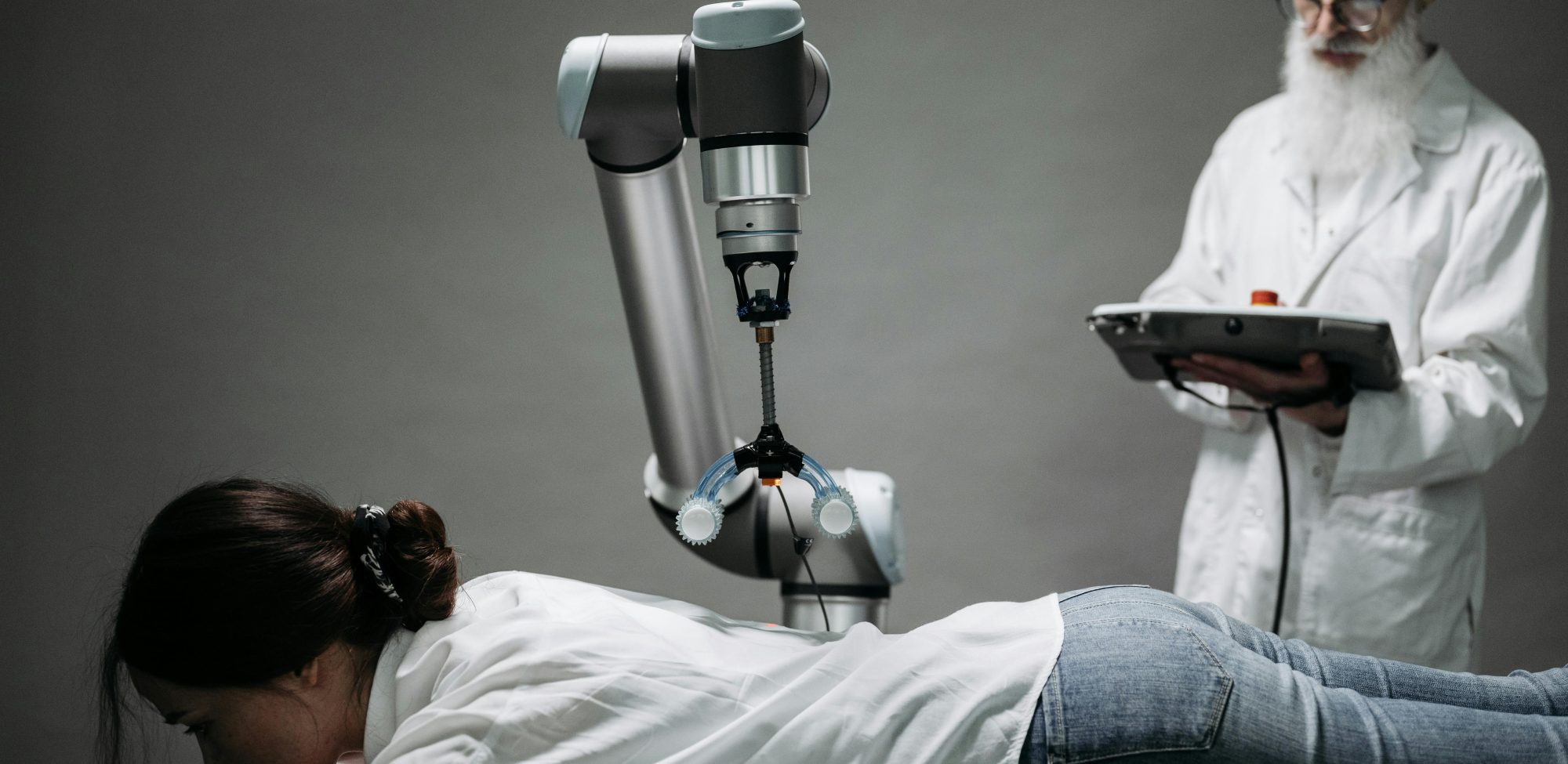AI in Mental Health: Revolutionary Breakthrough Transforming Lives Through Digital Therapy in 2025

AI in Mental Health: Revolutionary Breakthrough Transforming Lives Through Digital Therapy in 2025.
The mental health landscape is experiencing an unprecedented transformation as we navigate through 2025. With millions of people worldwide struggling with anxiety, depression, and various psychological challenges, the integration of AI in Mental Health has emerged as a beacon of hope, offering innovative solutions that were once considered science fiction. This revolutionary technology is not just changing how we approach mental wellness—it’s fundamentally reshaping the entire therapeutic ecosystem.
The statistics are staggering: according to recent data, one in four people will experience a mental health condition at some point in their lives. Traditional therapy, while effective, often comes with barriers such as cost, accessibility, and stigma. This is where AI in Mental Health steps in, bridging the gap between those who need help and the resources available to them.
Mental health professionals worldwide are embracing this technological revolution, recognizing that AI in Mental Health solutions can complement traditional therapy methods while extending care to previously underserved populations. The integration of artificial intelligence into mental health services represents a paradigm shift that promises to make quality mental health care more accessible, affordable, and effective than ever before.

The Mental Health Crisis: Why We Need AI Solutions Now
Mental health challenges have reached epidemic proportions globally. The World Health Organization reports that depression affects over 280 million people worldwide, while anxiety disorders impact approximately 301 million individuals. The COVID-19 pandemic has only intensified these numbers, creating an urgent need for scalable, accessible mental health solutions.
The current mental health crisis is multifaceted and complex. Beyond the sheer numbers of people affected, we’re seeing increasingly sophisticated presentations of mental health conditions. Social media, digital connectivity, and modern lifestyle stressors have created new categories of mental health challenges that traditional therapeutic approaches may not adequately address.
Traditional mental health services face numerous limitations that AI in Mental Health technologies are uniquely positioned to overcome:
- Geographic Barriers: Rural and remote areas often lack adequate mental health services
- Economic Constraints: The average cost of therapy sessions ranges from $100-$300 per hour
- Scheduling Limitations: Long waiting lists can extend for months in many healthcare systems
- Professional Shortages: There’s a significant shortage of qualified mental health professionals globally
- Cultural and Language Barriers: Many communities lack culturally competent mental health services
- Stigma and Privacy Concerns: Many individuals avoid seeking help due to social stigma
These challenges have created a perfect storm where AI in Mental Health technologies can make a significant difference. By leveraging artificial intelligence, we can provide immediate, personalized, and cost-effective support to millions of people who might otherwise go without help.
The economic burden of untreated mental health conditions is staggering. The World Economic Forum estimates that the global cost of mental health conditions will reach $6 trillion by 2030. This includes direct healthcare costs, lost productivity, and social welfare expenses. AI in Mental Health solutions offer a cost-effective alternative that can significantly reduce these economic impacts while improving outcomes for individuals and communities.
How AI in Mental Health Is Revolutionizing Digital Therapy
Personalized Treatment Approaches
The beauty of AI in Mental Health lies in its ability to create highly personalized treatment experiences. Unlike traditional one-size-fits-all approaches, AI systems can analyze vast amounts of data to understand individual patterns, triggers, and responses. This personalization extends across multiple dimensions:
Behavioral Pattern Analysis: Advanced AI in Mental Health systems can identify subtle changes in behavior that might indicate declining mental health. These systems analyze patterns in:
- Sleep cycles and quality
- Physical activity levels
- Social interaction frequency
- Communication patterns and tone
- Digital behavior and screen time
- Physiological markers through wearable devices
Predictive Modeling: By analyzing historical data, these systems can predict potential mental health crises before they occur. Machine learning algorithms can identify risk factors and early warning signs that might be invisible to human observers, enabling proactive interventions.
Customized Interventions: Treatment recommendations are tailored to individual needs, preferences, and circumstances. AI in Mental Health platforms can adjust therapeutic approaches based on:
- Personal history and trauma experiences
- Cultural background and values
- Learning style and communication preferences
- Response patterns to different interventions
- Comorbid conditions and medications
Real-Time Monitoring and Support
Modern AI in Mental Health platforms offer 24/7 monitoring capabilities that traditional therapy cannot match. These systems continuously track various indicators through multiple data sources:
Physiological Monitoring: Advanced sensors and wearable devices provide continuous monitoring of:
- Heart rate variability as a stress indicator
- Sleep patterns and sleep quality metrics
- Physical activity levels and exercise patterns
- Skin conductance changes indicating emotional arousal
- Body temperature fluctuations related to stress responses
Digital Behavior Analysis: AI in Mental Health systems can analyze digital footprints to assess mental health status:
- Typing patterns and speed variations
- Voice tone and speech pattern changes
- Social media activity and content analysis
- App usage patterns and screen time
- Online search behavior and content consumption
Environmental Context Integration: These systems can incorporate environmental factors that impact mental health:
- Weather patterns and seasonal changes
- Social events and calendar activities
- Work stress levels and deadlines
- Family dynamics and relationship status
- Financial stressors and life changes
This constant monitoring enables early intervention, potentially preventing mental health crises before they escalate. Users receive real-time feedback and support, creating a safety net that’s always available.
Breakthrough Technologies Shaping AI in Mental Health
Advanced Chatbots and Virtual Therapists
The latest generation of AI-powered chatbots represents a significant leap forward in AI in Mental Health technology. These sophisticated systems utilize natural language processing and machine learning to engage in meaningful conversations with users. They can:
Provide Immediate Emotional Support: Unlike human therapists who have limited availability, AI in Mental Health chatbots are available 24/7 to provide crisis intervention and emotional support. These systems can:
- Recognize signs of suicidal ideation and provide immediate crisis resources
- Offer coping strategies during panic attacks or anxiety episodes
- Provide grounding techniques during dissociative episodes
- Connect users with emergency services when necessary
Deliver Evidence-Based Therapeutic Techniques: Modern AI in Mental Health chatbots are trained on established therapeutic modalities:
- Cognitive Behavioral Therapy (CBT) techniques
- Dialectical Behavior Therapy (DBT) skills
- Mindfulness-based interventions
- Acceptance and Commitment Therapy (ACT) principles
- Trauma-informed care approaches
Adaptive Learning and Personalization: These systems continuously learn from user interactions to improve their effectiveness:
- Adjusting communication style based on user preferences
- Personalizing intervention timing and frequency
- Adapting therapeutic approaches based on user response patterns
- Integrating feedback to refine treatment recommendations
Wearable Technology Integration
Wearable devices have become crucial components of AI in Mental Health ecosystems. These devices continuously monitor physiological markers that correlate with mental health status:
Heart Rate Variability (HRV) Monitoring: HRV is a key indicator of stress and mental health status. AI in Mental Health systems can analyze HRV patterns to:
- Detect stress responses before they become overwhelming
- Identify optimal times for relaxation interventions
- Monitor recovery from stress episodes
- Predict potential anxiety or panic attacks
Sleep Quality Assessment: Sleep disturbances are closely linked to mental health conditions. Advanced AI in Mental Health wearables can:
- Track sleep stages and quality metrics
- Identify sleep pattern disruptions
- Recommend sleep hygiene improvements
- Monitor the impact of interventions on sleep quality
Activity and Movement Tracking: Physical activity levels are strong predictors of mental health status. AI in Mental Health systems can:
- Monitor daily activity levels and exercise patterns
- Detect changes in movement that may indicate depression
- Recommend personalized activity interventions
- Track the mental health benefits of physical exercise
Product Spotlight: Apple Watch Series 9
The Apple Watch Series 9 stands out as an exceptional tool for mental health monitoring in the AI in Mental Health ecosystem. Its advanced sensors can track heart rate variability, sleep patterns, and activity levels all crucial indicators of mental wellbeing. The watch’s mindfulness app, combined with its AI-powered health insights, makes it an invaluable companion for anyone prioritizing their mental health.
Key features that make the Apple Watch Series 9 ideal for AI in Mental Health monitoring include:
- Advanced Heart Rate Monitoring: Continuous heart rate tracking with irregular rhythm notifications
- Sleep Tracking: Comprehensive sleep stage analysis and sleep quality metrics
- Mindfulness Integration: Built-in meditation and breathing exercises
- Activity Tracking: Detailed fitness and movement monitoring
- Emergency Features: Fall detection and emergency SOS capabilities
- Health App Integration: Seamless data sharing with healthcare providers
The watch’s AI-powered insights can detect patterns in your physiological data that may indicate changes in mental health status. With features like stress notifications and guided breathing exercises, the Apple Watch Series 9 seamlessly integrates AI in Mental Health monitoring into daily life, providing users with actionable insights to support their mental wellness journey.
Virtual Reality Therapy Enhanced by AI
Virtual Reality (VR) therapy represents one of the most exciting applications of AI in Mental Health. This technology creates immersive environments where patients can safely confront their fears, practice social skills, or work through traumatic experiences.
Exposure Therapy Applications: AI in Mental Health VR systems can create controlled exposure scenarios for:
- Phobia treatment (heights, flying, spiders, social situations)
- PTSD therapy through gradual trauma exposure
- Social anxiety treatment through virtual social interactions
- Panic disorder treatment through controlled trigger exposure
Skill Building and Practice: VR environments powered by AI in Mental Health technology can provide safe spaces for:
- Social skills training for autism spectrum disorders
- Job interview practice for anxiety management
- Public speaking training for social anxiety
- Conflict resolution skills development
Immersive Relaxation and Mindfulness: AI in Mental Health VR applications can transport users to:
- Calming natural environments for stress relief
- Guided meditation spaces with interactive elements
- Biofeedback-enhanced relaxation experiences
- Personalized therapeutic landscapes
AI enhances VR therapy by:
- Adapting scenarios based on patient responses in real-time
- Monitoring physiological reactions during sessions
- Personalizing exposure levels to prevent overwhelm
- Providing real-time feedback to both patient and therapist
- Tracking progress and adjusting difficulty levels automatically
Evidence-Based Benefits of AI in Mental Health
Improved Accessibility and Reach
AI in Mental Health has democratized access to mental health services, addressing many of the barriers that have historically prevented people from receiving care:
Geographic Independence: Rural and remote areas, which often lack mental health services, can now access AI in Mental Health solutions through internet connectivity. This has been particularly transformative for:
- Indigenous communities with limited healthcare access
- Military personnel deployed in remote locations
- Elderly individuals with mobility limitations
- Individuals with disabilities that make travel difficult
Cost-Effectiveness: AI in Mental Health solutions are significantly more affordable than traditional therapy:
- Average cost of AI-powered therapy: $20-$80 per month
- Traditional therapy costs: $100-$300 per session
- Reduced need for emergency psychiatric services
- Lower hospitalization rates due to early intervention
Language and Cultural Accessibility: Advanced AI in Mental Health systems can:
- Provide services in multiple languages
- Adapt to cultural norms and values
- Understand cultural expressions of mental health symptoms
- Offer culturally appropriate interventions
Reduced Stigma: The privacy and anonymity of AI in Mental Health platforms help reduce stigma by:
- Allowing users to seek help without fear of judgment
- Providing education about mental health conditions
- Normalizing mental health care through technology
- Offering discrete access to resources and support
Enhanced Treatment Outcomes
Research consistently shows that AI in Mental Health interventions can be as effective as traditional therapy for many conditions:
Clinical Effectiveness: Studies have demonstrated:
- 60-80% improvement rates in anxiety and depression symptoms
- Faster response times to treatment interventions
- Better adherence to treatment protocols
- Reduced dropout rates compared to traditional therapy
Personalized Treatment Optimization: AI in Mental Health systems can:
- Identify the most effective interventions for individual users
- Adjust treatment intensity based on user progress
- Predict and prevent treatment setbacks
- Optimize timing of interventions for maximum effectiveness
Continuous Monitoring and Adjustment: Unlike traditional therapy with weekly sessions, AI in Mental Health provides:
- Real-time monitoring of mental health status
- Immediate adjustments to treatment plans
- Continuous feedback and support
- Early detection of symptom changes
Scalability and Consistency
Unlike human therapists, AI in Mental Health systems can serve unlimited numbers of users simultaneously while maintaining consistent quality of care:
Unlimited Capacity: AI in Mental Health platforms can:
- Serve thousands of users simultaneously
- Provide consistent quality of care regardless of demand
- Scale services without additional infrastructure costs
- Offer 24/7 availability without staffing limitations
Standardized Care Quality: AI in Mental Health systems ensure:
- Consistent application of evidence-based treatments
- Standardized assessment and screening procedures
- Uniform quality of therapeutic interventions
- Elimination of practitioner bias and variability
Addressing Concerns: Safety and Ethics in AI Mental Health
Privacy and Data Security
As AI in Mental Health systems collect sensitive personal information, robust privacy protections are essential. Leading platforms implement comprehensive security measures:
Data Protection Protocols: AI in Mental Health platforms must adhere to:
- HIPAA compliance for healthcare data protection
- GDPR requirements for European users
- End-to-end encryption for all communications
- Strict data anonymization protocols
- Regular security audits and assessments
User Control and Transparency: Effective AI in Mental Health systems provide:
- Clear privacy policies and terms of service
- User control over data sharing and deletion
- Transparent algorithmic decision-making processes
- Regular updates on data usage and sharing practices
Ethical Data Use: AI in Mental Health developers must ensure:
- Data is used solely for therapeutic purposes
- No unauthorized sharing with third parties
- Proper consent processes for data collection
- Regular ethical review of data practices

The Human Element: Balancing AI and Human Care
While AI in Mental Health offers numerous advantages, the importance of human connection in healing cannot be overlooked. The most effective approaches combine AI efficiency with human empathy:
Hybrid Care Models: The future of AI in Mental Health lies in hybrid models that combine:
- AI-powered screening and assessment
- Human therapist oversight and intervention
- Automated routine monitoring and support
- Human connection for complex emotional issues
Professional Supervision: AI in Mental Health systems should include:
- Licensed mental health professionals in oversight roles
- Regular review of AI recommendations and interventions
- Human intervention protocols for crisis situations
- Continuous training updates based on clinical expertise
Seamless Integration: Effective AI in Mental Health platforms provide:
- Smooth transitions between AI and human care
- Shared data and insights between AI and human providers
- Coordinated treatment planning and implementation
- Consistent messaging and therapeutic approaches
Algorithmic Bias and Fairness
Developers of AI in Mental Health systems are increasingly aware of the need to address algorithmic bias:
Diverse Training Data: AI in Mental Health systems must be trained on:
- Diverse demographic populations
- Multiple cultural and linguistic groups
- Various socioeconomic backgrounds
- Different age groups and life stages
Bias Detection and Mitigation: AI in Mental Health platforms should include:
- Regular audits of AI decision-making processes
- Bias detection algorithms and monitoring systems
- Diverse development and testing teams
- Ongoing monitoring for discriminatory outcomes
Inclusive Design Principles: AI in Mental Health systems should incorporate:
- Universal design principles for accessibility
- Cultural competency in therapeutic approaches
- Multilingual support and translation capabilities
- Adaptation for different technological literacy levels
The Future Landscape of AI in Mental Health
Emerging Technologies and Innovations
The future of AI in Mental Health looks incredibly promising, with several emerging technologies on the horizon:
Brain-Computer Interfaces (BCIs): Next-generation AI in Mental Health systems may include:
- Direct neural feedback for mental health monitoring
- Real-time brain activity analysis for mood tracking
- Neurofeedback training for anxiety and depression
- Personalized brain stimulation for treatment-resistant conditions
Augmented Reality Integration: AI in Mental Health applications may incorporate:
- Overlaying therapeutic interventions onto real-world environments
- Interactive mindfulness exercises in everyday settings
- Social anxiety training through augmented social interactions
- Trigger warning systems for PTSD management
Advanced Predictive Analytics: Future AI in Mental Health systems will feature:
- Population-level mental health trend analysis
- Personalized risk assessment algorithms
- Predictive modeling for treatment outcomes
- Early warning systems for mental health crises
Personalized Medication Management: AI in Mental Health platforms may include:
- Genetic analysis for medication selection
- Side effect prediction and monitoring
- Dosage optimization based on individual response
- Drug interaction detection and prevention
Integration with Healthcare Systems
AI in Mental Health is becoming increasingly integrated with broader healthcare systems:
Electronic Health Record Integration: AI in Mental Health platforms can:
- Share data with primary care providers
- Coordinate care across multiple specialties
- Provide comprehensive health monitoring
- Support integrated treatment planning
Preventive Care Applications: AI in Mental Health systems can contribute to:
- Population health management
- Preventive screening programs
- Early intervention initiatives
- Public health surveillance
Healthcare Cost Reduction: AI in Mental Health integration can:
- Reduce emergency department visits
- Prevent costly hospitalizations
- Improve treatment adherence
- Optimize resource allocation
Global Mental Health Transformation
AI in Mental Health is poised to address mental health disparities worldwide:
Developing Country Applications: AI in Mental Health can provide:
- Mental health services in resource-limited settings
- Training for local healthcare workers
- Culturally adapted interventions
- Scalable population-level interventions
Disaster Response and Crisis Management: AI in Mental Health systems can:
- Provide immediate psychological first aid
- Monitor population mental health during crises
- Coordinate mental health resource deployment
- Support long-term recovery and resilience building
Global Health Equity: AI in Mental Health can promote:
- Equal access to quality mental health care
- Reduced disparities in treatment outcomes
- Culturally appropriate care for diverse populations
- Sustainable mental health service delivery
Practical Applications: Real-World Success Stories
Corporate Mental Health Programs
Many organizations are integrating AI in Mental Health solutions into their employee wellness programs:
Workplace Stress Management: Companies using AI in Mental Health systems report:
- 40% reduction in stress-related sick days
- Improved employee engagement and productivity
- Earlier identification of burnout risk factors
- More effective stress management interventions
Employee Assistance Programs: AI in Mental Health enhanced EAPs provide:
- 24/7 mental health support for employees
- Anonymous screening and assessment tools
- Personalized wellness recommendations
- Crisis intervention and emergency support
Organizational Mental Health Insights: AI in Mental Health platforms can provide:
- Aggregate mental health trend analysis
- Workplace stressor identification
- Intervention effectiveness measurement
- Return on investment calculations
Educational Settings
Schools and universities are leveraging AI in Mental Health to support student wellbeing:
Student Mental Health Screening: AI in Mental Health systems in schools can:
- Identify students at risk for mental health issues
- Provide early intervention and support
- Monitor student wellbeing over time
- Connect students with appropriate resources
Campus Mental Health Services: Universities using AI in Mental Health report:
- Reduced wait times for counseling services
- Improved crisis intervention response
- Better student retention and academic performance
- More effective resource allocation
Preventive Mental Health Education: AI in Mental Health platforms can:
- Provide mental health literacy education
- Teach coping skills and resilience building
- Offer peer support and connection opportunities
- Promote help-seeking behaviors
Healthcare System Integration
Hospitals and clinics are incorporating AI in Mental Health into their standard care protocols:
Primary Care Integration: AI in Mental Health systems can:
- Screen for mental health conditions during routine visits
- Provide treatment recommendations to primary care providers
- Monitor patient mental health between appointments
- Coordinate care between primary care and mental health specialists
Emergency Department Applications: AI in Mental Health in emergency settings can:
- Rapid assessment of mental health crises
- Suicide risk assessment and intervention
- Appropriate disposition and treatment planning
- Follow-up care coordination
Inpatient Mental Health Services: AI in Mental Health platforms can:
- Support clinical decision-making
- Monitor patient progress and treatment response
- Predict discharge readiness and outcomes
- Coordinate aftercare planning

Choosing the Right AI Mental Health Solution
Key Features to Consider
When selecting AI in Mental Health tools, consider these essential features:
Evidence-Based Approaches: Look for AI in Mental Health solutions that:
- Are grounded in proven therapeutic methods
- Have clinical research supporting their effectiveness
- Use validated assessment tools and screening instruments
- Provide transparent information about their therapeutic approaches
Privacy and Security: Ensure AI in Mental Health platforms provide:
- Robust data encryption and security measures
- Clear privacy policies and user consent processes
- Compliance with relevant healthcare regulations
- User control over data sharing and deletion
Professional Oversight: Choose AI in Mental Health platforms with:
- Licensed mental health professionals involved in development
- Clinical supervision and oversight protocols
- Crisis intervention and emergency response capabilities
- Integration with human mental health services
User Experience and Accessibility: Prioritize AI in Mental Health solutions with:
- Intuitive, engaging user interfaces
- Accessibility features for users with disabilities
- Multilingual support and cultural adaptations
- Flexible delivery options (mobile, web, wearable)
Integration with Existing Care
AI in Mental Health solutions should complement, not replace, existing mental health services:
Care Coordination: Effective AI in Mental Health platforms should:
- Integrate with existing healthcare systems
- Share data with healthcare providers when appropriate
- Support collaborative care models
- Provide seamless transitions between AI and human care
Treatment Planning: AI in Mental Health systems should:
- Support personalized treatment planning
- Adapt to individual user needs and preferences
- Monitor treatment progress and outcomes
- Provide recommendations for treatment modifications
The Economic Impact of AI in Mental Health
Cost Savings and Efficiency
AI in Mental Health offers significant economic benefits across multiple sectors:
Healthcare Cost Reduction: AI in Mental Health systems can reduce costs through:
- Early intervention preventing costly crises
- Reduced emergency department visits
- Decreased hospitalization rates
- Improved treatment adherence and outcomes
Workplace Productivity: Companies implementing AI in Mental Health solutions report:
- Reduced absenteeism and sick leave
- Improved employee engagement and performance
- Lower healthcare insurance costs
- Decreased turnover and recruitment costs
Societal Benefits: AI in Mental Health provides broader economic benefits:
- Reduced burden on social services
- Improved educational outcomes
- Decreased criminal justice costs
- Enhanced economic productivity
Market Growth and Investment
The AI in Mental Health market is experiencing explosive growth:
Market Size and Projections: The AI in Mental Health market is:
- Currently valued at over $2.4 billion globally
- Projected to reach $9.9 billion by 2030
- Growing at a compound annual growth rate of 28.1%
- Attracting significant investment from major technology companies
Investment Trends: AI in Mental Health companies are receiving:
- Increased venture capital funding
- Strategic partnerships with healthcare organizations
- Government grants and research funding
- Corporate wellness program contracts
Insurance Coverage: AI in Mental Health services are gaining:
- Expanded insurance coverage and reimbursement
- Recognition as legitimate healthcare interventions
- Integration with employee health benefits
- Support from healthcare policy initiatives
Regulatory and Legal Considerations
Regulatory Framework
AI for Mental Health operates within a complex regulatory environment:
FDA Oversight: The FDA has established guidelines for AI for Mental Health devices:
- Classification of AI mental health tools as medical devices
- Requirements for clinical validation and safety testing
- Post-market surveillance and reporting requirements
- Guidelines for software as medical devices (SaMD)
Professional Licensing: AI for Mental Health platforms must consider:
- State licensing requirements for mental health services
- Professional supervision and oversight requirements
- Scope of practice limitations for AI systems
- Liability and malpractice considerations
International Regulations: AI in Mental Health companies must comply with:
- European Union Medical Device Regulation (MDR)
- Health Canada digital health regulations
- Australian Therapeutic Goods Administration requirements
- Country-specific data protection and privacy laws
Ethical Guidelines
AI in Mental Health development must adhere to established ethical principles:
Beneficence and Non-maleficence: AI for Mental Health systems should:
- Prioritize user safety and wellbeing
- Minimize potential harms and risks
- Provide clear warnings about limitations
- Include appropriate safeguards and fail-safes
Autonomy and Informed Consent: AI in Mental Health platforms should:
- Respect user autonomy and decision-making
- Provide clear information about system capabilities and limitations
- Obtain meaningful informed consent for data use
- Support user choice and control over their care
Justice and Equity: AI for Mental Health development should:
- Ensure equitable access to services
- Address potential biases and discrimination
- Consider diverse populations and needs
- Promote social justice and health equity
Future Challenges and Opportunities
Technical Challenges
AI in Mental Health faces several technical challenges that must be addressed:
Data Quality and Standardization: AI for Mental Health systems need:
- Standardized data collection and reporting methods
- High-quality training datasets
- Interoperability between different platforms
- Consistent outcome measurement tools
Algorithm Transparency: AI in Mental Health platforms must provide:
- Explainable AI decision-making processes
- Clear documentation of algorithmic approaches
- Transparency in bias detection and mitigation
- Regular algorithm auditing and validation
Scalability and Performance: AI for Mental Health systems must maintain:
- Consistent performance across large user populations
- Reliable service availability and uptime
- Efficient resource utilization and cost management
- Scalable infrastructure and support systems
Opportunities for Innovation
AI in Mental Health presents numerous opportunities for continued innovation:
Personalized Medicine: Future AI in Mental Health systems may include:
- Genetic analysis for treatment personalization
- Biomarker-based diagnosis and treatment selection
- Precision medicine approaches to mental health
- Individualized treatment protocols based on multiple data sources
Population Health Management: AI in Mental Health can contribute to:
- Community mental health surveillance
- Population-level intervention strategies
- Public health policy development
- Health equity initiatives
Global Mental Health: AI in Mental Health offers opportunities for:
- Expanding mental health services to underserved populations
- Addressing cultural and linguistic barriers to care
- Supporting global mental health initiatives
- Promoting mental health awareness and education

Conclusion: Embracing the AI Mental Health Revolution
As we progress through 2025, AI in Mental Health represents more than just a technological advancement—it’s a fundamental shift toward more accessible, personalized, and effective mental health care. The integration of artificial intelligence into mental health services is breaking down traditional barriers and creating new possibilities for healing and growth.
The evidence is clear: AI for Mental Health solutions are not replacing human therapists but rather enhancing their capabilities and extending their reach. This technology is democratizing access to mental health care, providing immediate support when needed, and offering personalized interventions that adapt to individual needs.
The journey toward fully realizing the potential of AI in Mental Health is ongoing, with significant challenges still to be addressed. Privacy concerns, algorithmic bias, regulatory compliance, and the need for human oversight remain important considerations. However, the benefits of AI in Mental Health technology far outweigh these challenges, particularly as the field continues to mature and improve.
For individuals struggling with mental health challenges, AI in Mental Health offers hope in the form of immediate, accessible, and effective support. For healthcare providers, it represents an opportunity to serve more people more effectively while maintaining high standards of care. For society as a whole, it promises a future where mental health care is truly universal and stigma-free.
The AI for Mental Health revolution is creating new possibilities for prevention, early intervention, and long-term support. As these technologies continue to evolve and improve, we can expect even more innovative solutions that will transform how we understand, treat, and prevent mental health conditions.
The economic impact of AI for Mental Health extends far beyond healthcare savings. By improving mental health outcomes, these technologies contribute to increased productivity, reduced social costs, and enhanced quality of life for millions of people worldwide. The return on investment in AI in Mental Health technologies is substantial, both in terms of individual wellbeing and societal benefits.
Looking ahead, the future of AI in Mental Health is bright with possibility. Emerging technologies like brain-computer interfaces, advanced predictive analytics, and personalized medicine approaches will continue to expand the capabilities of these systems. The integration of AI for Mental Health with broader healthcare systems will create more comprehensive and coordinated care models.
The global reach of AI for Mental Health technologies offers hope for addressing mental health disparities worldwide. As these systems become more sophisticated and accessible, they have the potential to bring quality mental health care to underserved populations, regardless of geographic location or economic circumstances.
By embracing these technologies thoughtfully and responsibly, we can create a world where mental health support is available to everyone, everywhere, whenever they need it. The AI for Mental Health revolution is not just changing therapy it’s changing lives, one algorithm at a time.
The future of mental health care is digital, personalized, and powered by artificial intelligence. It’s a future that holds tremendous promise for millions of people worldwide, offering hope, healing, and the possibility of a better tomorrow. As we continue to advance and refine AI for Mental Health technologies, we move closer to a world where mental health care is truly accessible, effective, and transformative for all.

